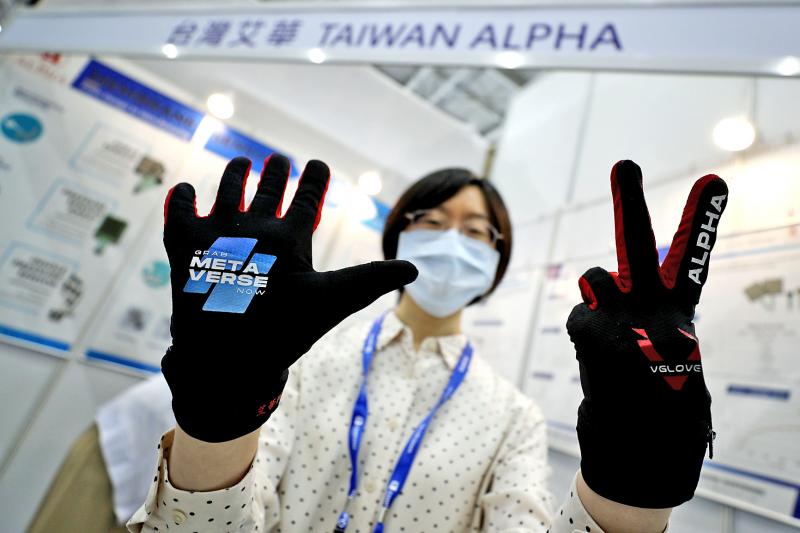The Ministry of Economic Affairs yesterday said it would offer higher tax incentives for research and development (R&D), and for advanced equipment investment for local firms that are important links in global supply chains, such as semiconductor companies.
The ministry plans to raise tax benefits for companies’ R&D efforts to a 25 percent rebate on costs, compared with 15 percent currently, it said in a statement.
The ministry also plans to eliminate a tax deduction limit of NT$1 billion (US$33.63 million) on newly acquired advanced equipment, it said, adding that the 5 percent limit on overall new equipment spending is to remain unchanged.

Photo: Ritchie B. Tongo, EPA-EFE
The ministry said it expects the legislature to pass the measures, which would be added to the Statute for Industrial Innovation (產業創新條例), by the end of the year.
The move comes as the world’s major economies — including the EU, Japan, South Korea and the US — plan tax incentives and substantial subsidies to bolster key components and semiconductor supply chains at home, as supply chain resilience becomes a national security issue for some nations, the ministry said.
The US seeks to push through the Creating Helpful Incentives for Producing Semiconductors for America Act to pump US$52 billion in subsidies for making semiconductors in the US, while the EU also plans to spend about 11 billion euros by 2030 to fund the development of semiconductor research, design and manufacturing capabilities, the ministry added.
Taiwan Semiconductor Manufacturing Co (台積電) has received a subsidy of ¥400 billion (US$3.01 billion) from the Japanese government to build a new fab in Kumamoto Prefecture, the ministry said, adding that the chipmaker is also expecting to receive US subsidies for its new fab in Arizona.
“With countries around the world striving to achieve independence on key component supply, their actions could undermine the existing partnerships [with Taiwan], or bring new competitors,” the ministry said.
Such development “could further diminish the nation’s role in global supply chains,” it added.
To keep up with the incentives being offered in other countries, the “government should add new tax incentives to help strategically important local industries enhance their competitiveness,” the ministry said.
Tax relief and subsidies are being offered at home to safeguard Taiwan’s global role in the semiconductor, electric vehicle and 5G industries, the ministry said.

SELL-OFF: Investors expect tariff-driven volatility as the local boarse reopens today, while analysts say government support and solid fundamentals would steady sentiment Local investors are bracing for a sharp market downturn today as the nation’s financial markets resume trading following a two-day closure for national holidays before the weekend, with sentiment rattled by US President Donald Trump’s sweeping tariff announcement. Trump’s unveiling of new “reciprocal tariffs” on Wednesday triggered a sell-off in global markets, with the FTSE Taiwan Index Futures — a benchmark for Taiwanese equities traded in Singapore — tumbling 9.2 percent over the past two sessions. Meanwhile, the American depositary receipts (ADRs) of Taiwan Semiconductor Manufacturing Co (TSMC, 台積電), the most heavily weighted stock on the TAIEX, plunged 13.8 percent in

A wave of stop-loss selling and panic selling hit Taiwan's stock market at its opening today, with the weighted index plunging 2,086 points — a drop of more than 9.7 percent — marking the largest intraday point and percentage loss on record. The index bottomed out at 19,212.02, while futures were locked limit-down, with more than 1,000 stocks hitting their daily drop limit. Three heavyweight stocks — Taiwan Semiconductor Manufacturing Co (TSMC, 台積電), Hon Hai Precision Industry Co (Foxconn, 鴻海精密) and MediaTek (聯發科) — hit their limit-down prices as soon as the market opened, falling to NT$848 (US$25.54), NT$138.5 and NT$1,295 respectively. TSMC's

ASML Holding NV, the sole producer of the most advanced machines used in semiconductor manufacturing, said geopolitical tensions are harming innovation a day after US President Donald Trump levied massive tariffs that promise to disrupt trade flows across the entire world. “Our industry has been built basically on the ability of people to work together, to innovate together,” ASML chief executive officer Christophe Fouquet said in a recorded message at a Thursday industry event in the Netherlands. Export controls and increasing geopolitical tensions challenge that collaboration, he said, without specifically addressing the new US tariffs. Tech executives in the EU, which is

In a small town in Paraguay, a showdown is brewing between traditional producers of yerba mate, a bitter herbal tea popular across South America, and miners of a shinier treasure: gold. A rush for the precious metal is pitting mate growers and indigenous groups against the expanding operations of small-scale miners who, until recently, were their neighbors, not nemeses. “They [the miners] have destroyed everything... The canals, springs, swamps,” said Vidal Britez, president of the Yerba Mate Producers’ Association of the town of Paso Yobai, about 210km east of capital Asuncion. “You can see the pollution from the dead fish.